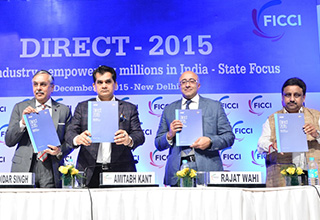DIPP pushes for formation, implementation of guidelines for Direct Selling Industry in various states
Updated: Dec 08, 2015 04:52:08pm

Industry has a potential to grow to INR 1000 billion by 2025 much beyond the FICCI-KMPG report projection of INR 645 billion, he said while addressing at FICCI DIRECT 2015, an annual flagship event for Direct Selling (DS) industry..
Acknowledging the need for clarity in definition of direct selling and a separate regulatory framework for the industry, Kant said that DIPP has already submitted the draft guidelines to Ministry of Consumer Affairs for the direct selling industry and is hopeful for its implementation by various states.
He also urged the industry to embrace technology as the industry can deliver better and even faster once technology becomes its strength.
Kant released FICCI-KPMG report on ‘Direct selling- Mapping the industry across Indian states.’
Direct selling, one of the oldest and traditional forms of selling, is today a successful industry operating in over 100 countries, with a market size of USD 180 billion.
In India, the market was estimated at INR 75 billion (2013-14), and forms around 0.4 per cent of the total retail sales in the country. To showcase the potential and highlight the opportunities and challenges faced by the DS industry, FICCI organizes its annual event on Direct Selling ‘DIRECT’ every year.
The Report ‘Direct 2015 – Direct selling- Mapping the industry across Indian states’ highlights the current challenges faced by the industry and the potential that the industry holds in select Indian states.
According to the report, the industry has recorded high double digit growth of about 16 per cent over the past four to five years. The market has grown to become a key channel for distribution of goods and services in the country, especially for health and wellness products, cosmetics, consumer durables, water purifiers and vacuum cleaners.
The report also lists the challenges faced by the direct selling industry, one of the biggest being the lack of regulatory clarity. In our opinion, to provide a conducive and sustainable operating environment, a series of reforms are required ranging from short-term reforms like amendments in existing Acts/policies to long-term measures like implementing a specific governing legislation for the sector.
A separate policy framework for the direct selling industry is required which helps identify ethical industry players, and can help regain consumers’ confidence.
The direct selling industry has significantly contributed to women empowerment, skill development, technology percolation and the growth of the SMEs sector in the states, besides contributing to the state exchequer. (KNN Bureau)












